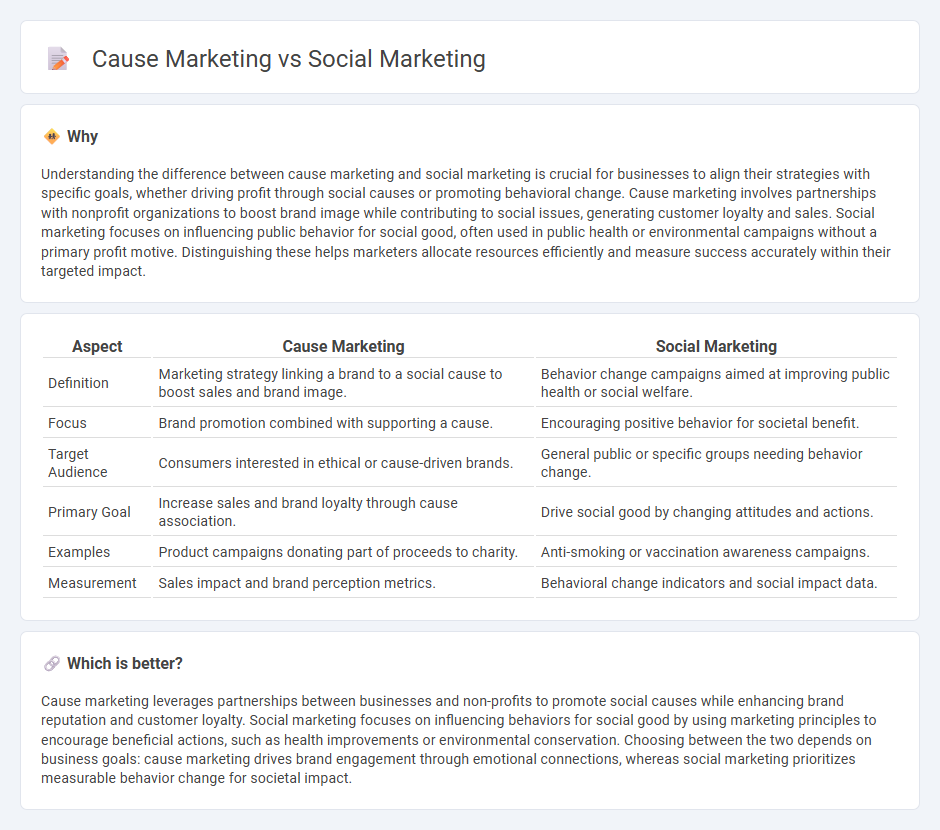
Cause marketing aligns brands with social or environmental causes to enhance reputation and drive customer loyalty through shared values. Social marketing focuses on changing individual behaviors for societal benefit, often using public health campaigns or environmental initiatives. Discover the key differences and strategic benefits of each approach to elevate your marketing efforts.
Why it is important
Understanding the difference between cause marketing and social marketing is crucial for businesses to align their strategies with specific goals, whether driving profit through social causes or promoting behavioral change. Cause marketing involves partnerships with nonprofit organizations to boost brand image while contributing to social issues, generating customer loyalty and sales. Social marketing focuses on influencing public behavior for social good, often used in public health or environmental campaigns without a primary profit motive. Distinguishing these helps marketers allocate resources efficiently and measure success accurately within their targeted impact.
Comparison Table
| Aspect | Cause Marketing | Social Marketing |
|---|---|---|
| Definition | Marketing strategy linking a brand to a social cause to boost sales and brand image. | Behavior change campaigns aimed at improving public health or social welfare. |
| Focus | Brand promotion combined with supporting a cause. | Encouraging positive behavior for societal benefit. |
| Target Audience | Consumers interested in ethical or cause-driven brands. | General public or specific groups needing behavior change. |
| Primary Goal | Increase sales and brand loyalty through cause association. | Drive social good by changing attitudes and actions. |
| Examples | Product campaigns donating part of proceeds to charity. | Anti-smoking or vaccination awareness campaigns. |
| Measurement | Sales impact and brand perception metrics. | Behavioral change indicators and social impact data. |
Which is better?
Cause marketing leverages partnerships between businesses and non-profits to promote social causes while enhancing brand reputation and customer loyalty. Social marketing focuses on influencing behaviors for social good by using marketing principles to encourage beneficial actions, such as health improvements or environmental conservation. Choosing between the two depends on business goals: cause marketing drives brand engagement through emotional connections, whereas social marketing prioritizes measurable behavior change for societal impact.
Connection
Cause marketing and social marketing are connected through their shared goal of promoting social good while driving positive behavioral change. Cause marketing leverages partnerships between businesses and nonprofits to raise awareness and funds for specific issues, whereas social marketing applies marketing principles to influence behaviors that benefit society. Both strategies utilize targeted messaging and audience engagement to address social challenges and create impact.
Key Terms
**Social Marketing:**
Social marketing uses marketing principles to influence behaviors that benefit individuals and communities for the greater social good, often addressing public health, safety, and environmental issues. It employs targeted campaigns and psychological insights to drive positive behavior change, such as increasing vaccination rates or promoting recycling habits. Discover how social marketing strategies can effectively create meaningful social impact.
Behavior Change
Social marketing targets behavior change by using marketing principles to influence voluntary actions that benefit individuals and society, such as improving health or promoting environmental sustainability. Cause marketing blends commercial and social goals, linking a brand to a social cause to enhance reputation and drive sales while supporting charitable efforts. Explore how these strategies differ in impact and application to optimize your campaigns effectively.
Public Health
Social marketing uses behavioral science to promote health behaviors that improve public well-being, targeting issues like smoking cessation, vaccination uptake, and healthy eating. Cause marketing partners brands with public health campaigns to raise funds and awareness, often linking product sales to health-related causes like disease prevention or mental health support. Discover how these strategies uniquely contribute to advancing public health goals.
Source and External Links
Social marketing - Wikipedia - Social marketing is an approach that applies commercial marketing principles to influence behaviors for the common good, aiming not just at individual behavior change but also socio-cultural and structural transformations for social benefits.
What Is Social Marketing? 10 Examples of How It Works for Business - Social marketing uses marketing techniques to promote social change by "selling" behaviors that benefit society, such as health improvements, environmental protection, or social activism, rather than selling products.
Weinreich Communications - What is Social Marketing? - Social marketing focuses on influencing social behaviors for the benefit of society by listening closely to the target audience's needs and using research-driven strategies adapted from commercial marketing.
 dowidth.com
dowidth.com